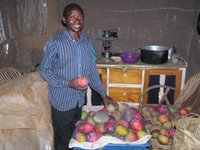Why are we moving to Africa?
 There are many answers to this question. As strange as it may sound, it feels like the logical thing to do given the path our lives have taken these last 5 years. While there is a significant sense of loss for what we will leave behind, there is an equal sense of "calling" towards this -- not that Africa needs us, but rather, we need Africa. We are going to learn, we are going to witness, we are going to do our small part to help, but most of all we hope that we are going to be a bridge between two worlds that both need each other. The quote below from Shane Claiborne captures this idea well. We want you to go with us, we need you to go with us.
There are many answers to this question. As strange as it may sound, it feels like the logical thing to do given the path our lives have taken these last 5 years. While there is a significant sense of loss for what we will leave behind, there is an equal sense of "calling" towards this -- not that Africa needs us, but rather, we need Africa. We are going to learn, we are going to witness, we are going to do our small part to help, but most of all we hope that we are going to be a bridge between two worlds that both need each other. The quote below from Shane Claiborne captures this idea well. We want you to go with us, we need you to go with us.Dave Anderson and friend, DR Congo, October 2005

"I long for the Calcutta slums to meet the Chicago suburbs, for lepers to meet landowners, and for each to see God's image in the other. It's no wonder that the footsteps of Jesus lead from the tax collectors to the lepers. I truly believe that when the poor meet the rich, riches will have no meaning. And when the rich meet the poor, we will see poverty come to an end."
Shane Claiborne, The Irresistible Revolution
What will we be doing?
World Vision received a $35 million U.S. government grant to fund a country wide program involving many partners to serve people made vulnerable by HIV/AIDS at the household level. The program meets both the immediate needs of orphans and vulnerable children, and people living with HIV/AIDS but also creates a platform for developing the resilience of these households.
I will be working for the National Director of Zambia and the Director of this program to help meet communication needs related to this project and to help develop the strategies for raising an additional $9 million in private funding needed for this program.
95%+ of our staff around the world are indigenous to the countries or regions where they are working, which is one of our greatest strengths as an organization. This opportunity for me to learn and experience the program side of what we do is a great gift that I want to steward well. I have the chance to learn first hand from some of the most effective people in the world who are working and making a difference on the ground. I am grateful for this chance.
Molly and the kids will be experiencing a whole new life that we can't even pretend we understand at this point. We do know that the kids will be at a wonderful school that will challenge and enrich them. Molly is looking forward to being able to involve herself first hand with ministries that are caring for the children who have lost their parents. We will have the chance to explore Zambia and southern Africa (e.g. Victoria Falls, Kafue National Park, Zambezi River) and will be bringing our tent and Bennett's wooden sword and Masai club to keep us safe from the animals. Come join us.
The plan at this point is for me to go over to Zambia for 4-5 weeks on April 6th (Please be in touch with Molly on ways to help her out while I am gone.) I will then be back in May to wrap things up here/transition, celebrate Brad and Carrie's wedding, spend time at the cabin and with friends, and say our farewells, with a mid-July departure date for the whole family.
We ask for your prayers over these coming months and as we go. We truly believe that we are going as an extension of you and in some mysterious way, with you.
We will be updating this page often in the coming months - At the bottom of this page you can sign up to get an automatic e-mail every time we make a new posting.
Thank you for your love and friendship.






